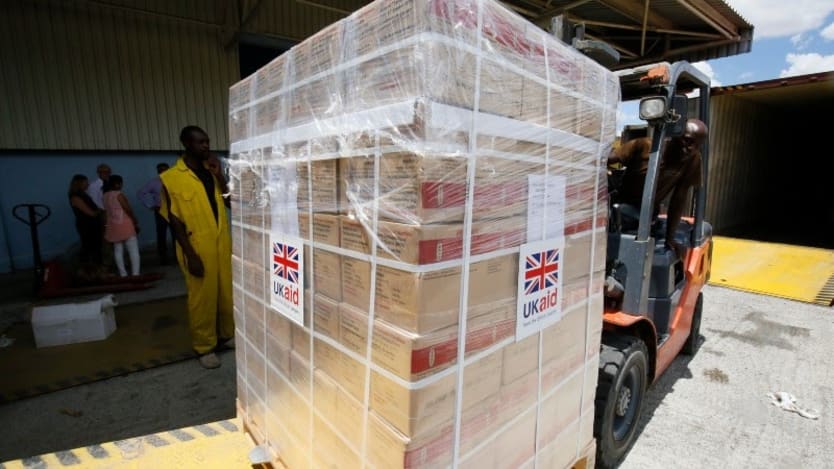
LONDON — Amid widespread condemnation of the U.K. government’s decision to merge the Department for International Development with the Foreign & Commonwealth Office, some voices from the development sector have tentatively expressed support for the move.
The creation of a new department — the Foreign, Commonwealth and Development Office — was declared in a surprise announcement Tuesday by Prime Minister Boris Johnson and immediately met with dismay and fury from across the U.K. development sector.
'A real kick in the teeth': DFID staffers speak out on merger
DFID staff members are left with more questions than answers after the announcement that their department would be dissolved.
There are widely held concerns that the merger of DFID, a much-respected institution, will lead to lower aid impact and transparency and that the move is a distraction from domestic political troubles.
But a handful of experts told Devex the move was a fair decision or provided opportunities to improve development practice, even if the announcement’s timing was questionable.
James Cowan, CEO of The HALO Trust, a demining charity, said the merger was “the right thing to do” and contributed to the U.K.’s post-Brexit “Global Britain” strategy.
“Whether there are different structures is an input question. … The focus should be on the outcomes, [which are] meeting our humanitarian responsibilities to our beneficiaries,” he said.
The HALO Trust has ongoing projects in both Ukraine and the Balkans, places highlighted by Johnson as potential candidates for renewed aid focus due to their significance to U.K. security.
Cowan, a retired British army general, said his experience of Whitehall led him to conclude that there were government coherence issues that needed to be addressed. “By failing to work together, it's our beneficiaries who suffer,” he added.
Afghanistan, where The HALO Trust has its biggest program, is an “extremely concerning” example of this lack of coherence, Cowan argued.
“Until 2018, we had 1,000 deminers funded by the British government, both DFID and from the CSSF [the cross-government Conflict, Stability and Security Fund]. Today, we only have 63, and it feels like we’ve stumbled into that and it can’t be right. I want to see much more concerted, coordinated policy.”
The development sector’s concerns around transparency arise from FCO’s record on the issue, which is far poorer than DFID’s. But Cowan said he saw “no reason at all” that aid spending transparency should be degraded by the merger, noting he was more concerned about the transparency of multilateral institutions where U.K. aid is sent.
He stressed that DFID’s experience should be retained and suggested the merger’s immediate emphasis should be on empowering ambassadors overseas to avoid a “very distracting series of moves in London” until the COVID-19 pandemic has subsided.
But Cowan warned:“It’s easy enough to make an announcement; it’s much harder to deliver on it. Real care needs to be taken about how it's done.”
Another to put her head above the parapet was Marta Foresti, director of the Overseas Development Institute’s Europe program, who spoke to Devex in a personal capacity. She was highly critical of many aspects of the merger, saying that “DFID is a massive loss” and that the short-term results would be negative.
But she added: “The sector is in desperate need for some radical change, and there is a bit of tendency to maintain the status quo. ... It’s an inevitable path, and a path we need to begin to walk, [and] part of it will be dismantling or changing some of the existing architecture of the sector.”
“A stand-alone DFID no longer makes sense. ... It will be much more influential as part of British foreign policy if all the instruments work together.”
— Dr. Mukesh Kapila, former head of conflict and humanitarian affairs, DFIDForesti said the cost of U.K. development policy’s ringfenced position — existing separately from core government business — was that it became “disconnected and not influential” in broader government thinking. It also reinforced paternalistic “them and us” attitudes — a “deeply flawed” model, she said. “It's just not going to cut it with the public [and] the politicians,” she added.
A powerful, integrated but autonomous development agency could, in time, have “some positive outcomes,” Foresti said, including the potential to “bring development inside policy conversations not about poor countries but about global challenges.”
“You don’t begin with development; you begin with climate, conflict and security, mobility, international crime. ... And you bring what we know about working in particular settings around the world, fostering local and regional development as part of the solution,” she said.
That sentiment was echoed by Dr. Mukesh Kapila, who served as head of conflict and humanitarian affairs at DFID and at its previous incarnation, the Overseas Development Administration, which sat within FCO. He said the merger was “long overdue” and that it is time to examine the role of U.K. aid in the Sustainable Development Goals era, characterized by threats such as climate change, conflict, displacement and resource shortages, as well as the increasing assertiveness of lower- and middle-income countries. With Brexit, the U.K.’s position has also changed, Kapila said.
“A stand-alone DFID no longer makes sense in that particular context. It will be much more influential as part of British foreign policy if all the instruments work together,” he argued.
While the merger’s timing has seen massive criticism, Kapila said it was “very timely” and the pandemic was “a great opportunity to bring about change. ... We need to respond to a new world of desperate need right now, not at some future date.”
Citing knowledge of his former colleagues, Kapila said DFID staff headhunted by FCO already have “huge” influence in the latter department. He said that foreign policy would be upgraded by the influence of development thinking and that staff from the two departments had frequently worked effectively together.
“To demonize the Foreign Office, saying that all diplomats are ... behaving in an immoral way ... is absolute rubbish, in the same way it is to say that all of aid is wonderful,” he said.
“By humanizing foreign policy, by bringing substance to foreign policy … I think we have the chance to reassert British influence in a more meaningful way than what was happening,” he added. This could also lead to a “better place to defend the integrity of aid,” Kapila said.
Update, June 22: This story was updated to include additional information.








